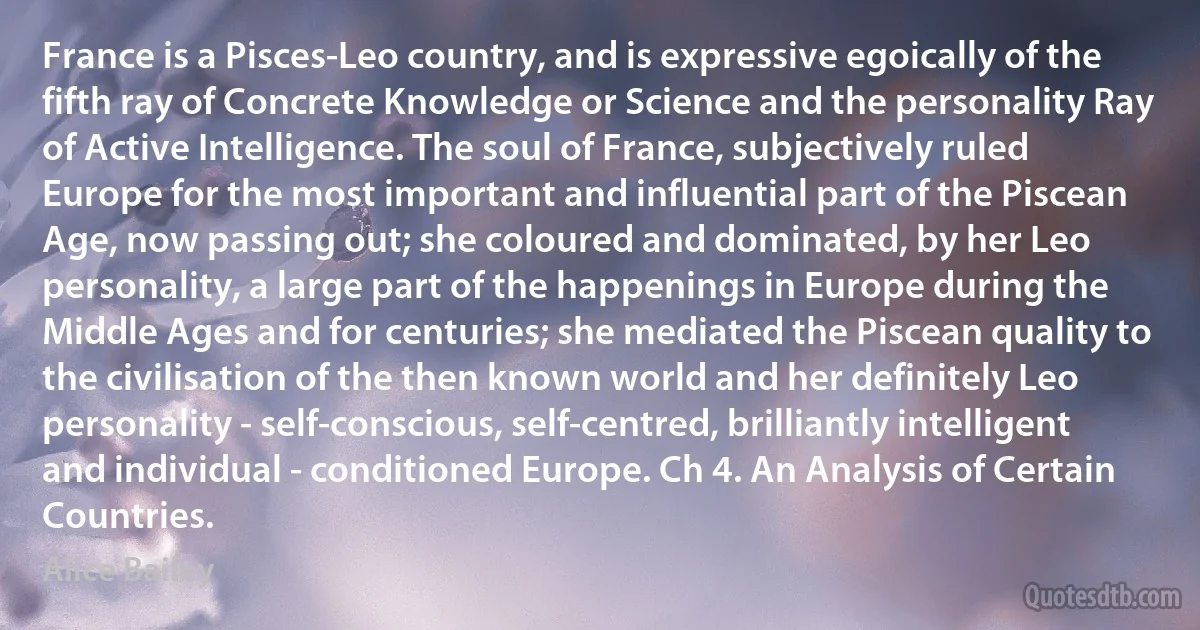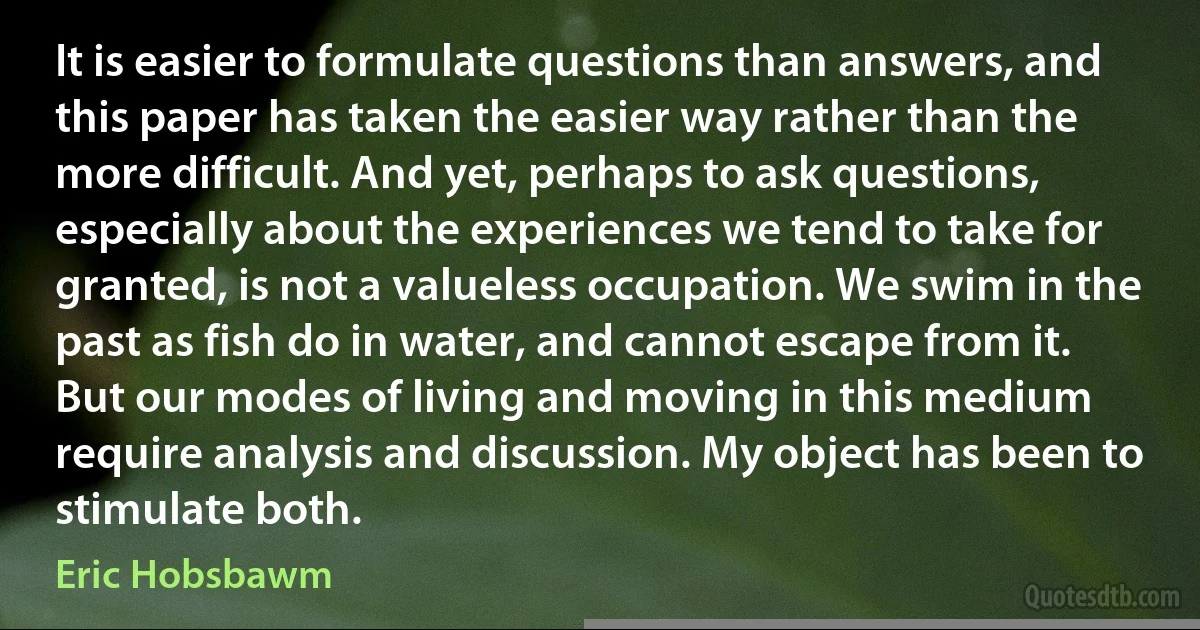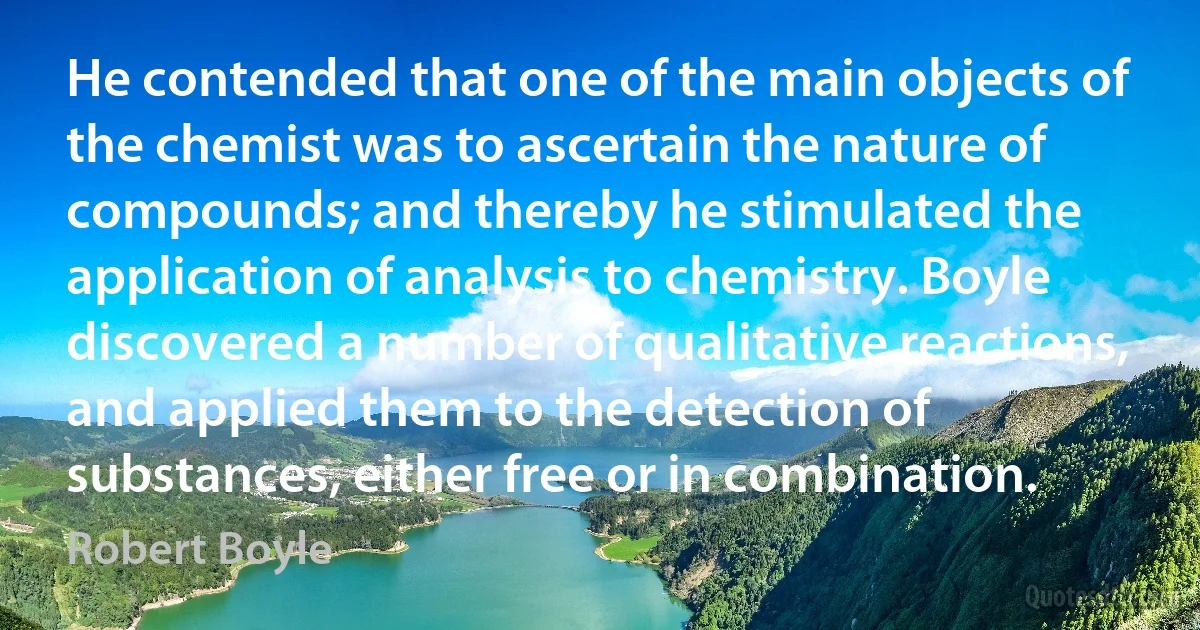Analysis Quotes - page 36
Angell argued that in a modern economy no economic benefit could be generated even by successful wars of conquest... Angell's argument showed, beyond reasonable doubt, that war and territorial expansion are not, in general sensible policies. His views have often been derided on the basis that they were falsified by the outbreak of the Great War in 1914, which was pursued to the bitter end even though it destroyed the global market economy that had formed the backdrop to his analysis. But in reality the outcome proved him right. Of course, Germany, the power most influenced by the arguments of Clausewitz and his successors, reaped nothing but grief from the war. But the attempts of the victorious allies to exact reparations, extend their colonial influence and so on were also entirely futile, exactly as Angell had predicted.

Norman Angell
I summarize more than 30 years of research on factors that can create a "perfect storm" which leads good people to engage in evil actions. This transformation of human character is what I call the "Lucifer Effect," named after God's favorite angel, Lucifer, who fell from grace and ultimately became Satan.
Rather than providing a religious analysis, however, I offer a psychological account of how ordinary people sometimes turn evil and commit unspeakable acts.

Philip Zimbardo
I began my book about perestroika and the new thinking with the following words: "We want to be understood". After a while I felt that it was already happening. But now I would like once again to repeat those words here, from this world rostrum. Because to understand us really - to understand so as to believe us - proved to be not at all easy, owing to the immensity of the changes under way in our country. Their magnitude and character are such as to require in-depth analysis. Applying conventional wisdom to perestroika is unproductive. It is also futile and dangerous to set conditions, to say: We'll understand and believe you, as soon as you, the Soviet Union, come completely to resemble "us", the West.
No one is in a position to describe in detail what perestroika will finally produce. But it would certainly be a self-delusion to expect that perestroika will produce "a copy" of anything.

Mikhail Gorbachev
Through the week, more information on the attacks came in, and I spent considerable time reviewing this data, as well as reams of classified material on the rest of the world. My practice in prior government jobs had been to consume as much intelligence as I could. I might have agreed or disagreed with analyses or conclusions, but I was always ready to absorb more information. Proof of the Assad regime's chemical-weapons usage was increasingly clear in public reporting, although left-wing commentators, and even some on Fox, were saying there was no evidence. They were wrong.

John R. Bolton
I thought... that the fact that in characterizing truth for a language it is necessary to put words into relations with objects was enough to give some grip for the idea of correspondence; but this now seems to me a mistake. The mistake is in a way only a misnomer, but terminological infelicities have a way of breeding conceptual confusion, and so it is here. Correspondence theories have always been conceived as providing an explanation or analysis of truth, and this, a Tarski-style theory of truth, certainly does not do.

Donald Davidson (philosopher)
Values are social norms - they're personal, emotional, subjective, and arguable. All of us have values. Even criminals have values. The question you must ask yourself is, Are your values based upon principles? In the last analysis, principles are natural laws - they're impersonal, factual, objective and self-evident. Consequences are governed by principles and behavior is governed by values; therefore, value principles!

Stephen Covey
I simply like Chuang Tzu because he is what he is and I feel no need to justify this liking to myself or to anyone else. He is far too great to need any apologies from me. ... His philosophical temper is, I believe, profoundly original and sane. It can of course be misunderstood. But it is basically simple and direct. It seeks, as does all the greatest philosophical thought, to go immediately to the heart of things.
Chuang Tzu is not concerned with words and formulas about reality, but with the direct existential grasp of reality in itself. Such a grasp is necessarily obscure and does not lend itself to abstract analysis. It can be presented in a parable, a fable, or a funny story about a conversation between two philosophers.

Thomas Merton
The case for European solidarity has never been stronger than it is today because the pressures piling up on Europe are themselves strong and varied. At the moment the headlines in our newspapers concentrate on certain trading arguments with the United States. Clearly we in Europe deal better with these problems when we work together, and where pressures become unacceptable we can best secure their relaxation by reacting together. Of course we should remind ourselves that our aim is not to confront the United States with our own economic strength, great though that is if we work together. Our aim must be to work out a common view with the United States, based in the case of the pipeline on a common analysis of the role of trade in East–West relations.

Douglas Hurd
Though Dogma and theology are always intimately related and can never be separated, yet they are never entirely of the same stuff. Dogma is a vast domain which theology will never wholly exploit. There is always infinitely more in Dogma, considered in its concrete totality, that is to say, in the very Object of divine revelation, than in this "human science of revelation", in this product of analysis and rational elaboration which theology always is. The latter, in its very truth, will always-and all the more in that it will always be rationally formulated-be inadequate for Dogma; for it is indeed the explanation of it, but not the fulness. This weakness is congenital. True theology knows that. It does not confuse the orders.

Henri de Lubac
My son is taking a course in philosophy, and last night we were looking at something by Spinoza and there was the most childish reasoning! There were all these attributes, and Substances, and all this meaningless chewing around, and we started to laugh. Now how could we do that? Here's this great Dutch philosopher, and we're laughing at him. It's because there's no excuse for it! In the same period there was Newton, there was Harvey studying the circulation of the blood, there were people with methods of analysis by which progress was being made! You can take every one of Spinoza's propositions, and take the contrary propositions, and look at the world and you can't tell which is right.

Baruch Spinoza
...For natural science he [Otto von Bismarck] shewed little interest, and indeed at that time it scarcely could be reckoned among the ordinary subjects of education; philosophy he pursued rather as a man than as a student, and we are not surprised to find that it was Spinoza rather than Kant or Fichte or Hegel to whom he devoted most attention, for he cared more for principles of belief and the conduct of life than the analysis of the intellect.
...He [Otto von Bismarck] astonished his friends by the amount and variety of his reading; it was at this time that he studied Spinoza. It is said that he had among his friends the reputation of being a liberal; it is probable enough that he said and did many things which they did not understand; and anything they did not understand would be attributed to liberalism by the country gentlemen of Pomerania; partly no doubt it was due to the fact that in 1843 he came back from Paris wearing a beard.

Baruch Spinoza
Well, that can happen. Memories can be implanted, even just through suggestion and constant repetition. And if a therapist augments that with hypnosis, really unshakable false memories can be created.”
"But why on earth would a therapist do that?”
Heather looked grim. "To quote an old Psych Department joke, there are many routes to mental health, but none so lucrative as Freudian analysis.

Robert J. Sawyer
Analysis as an instrument of enlightenment and civilization is good, in so far as it shatters absurd convictions, acts as a solvent upon natural prejudices, and undermines authority; good, in other words, in that it sets free, refines, humanizes, makes slaves ripe for freedom. But it is bad, very bad, in so far as it stands in the way of action, cannot shape the vital forces, maims life at its roots. Analysis can be a very unappetizing affair, as much so as death.

Thomas Mann
Poincaré analyses how the reality of three dimensional Euclidean (or non-Euclidean) space, has been constructed from our daily experiences as a human being with the objects that are most important for us (rigid bodies), and closely around. This does not mean that this three dimensional space is an ‘invention' of humanity. It exists, but the way we have ordered, and later on formalized it, by means of specific mathematical models, does make part of it. In other words, what we call the three dimensional reality of space partly exists in its own and partly exists by the structures that we have constructed, relying on our specific human experience with it.

Diederik Aerts
It is a maxim universally admitted in geometry, and indeed in every branch of knowledge, that, in the progress of investigation, we should proceed from known facts to what is unknown. ...In this manner, from a series of sensations, observations, and analyses, a successive train of ideas arises, so linked together, that an attentive observer may trace back to a certain point the order and connection of the whole sum of human knowledge.

Antoine Lavoisier
What happened was, 2,400 years ago, the Greek Gang of Three, by whom I mean Aristotle, Plato and Socrates, started to think based on analysis, judgment and knowledge. At the same time, church people, who ran the schools and universities, wanted logic to prove the heretics wrong. As a result, design and perceptual thinking was never developed. People assumed philosophers were doing it and so they blocked anyone else from doing it. But philosophers were not. Philosophers may look out at the world from a stained-glass window, but after a while they stop looking at the world and start looking at the stained glass.

Edward de Bono
Philosophy is based on speculation, on logic, on thought, on the synthesis of what we know and on the analysis of what we do not know. Philosophy must include within its confines the whole content of science, religion and art. But where can such a philosophy be found? All that we know in our times by the name of philosophy is not philosophy, but merely "critical literature" or the expression of personal opinions, mainly with the aim of overthrowing and destroying other personal opinions. Or, which is still worse, philosophy is nothing but self-satisfied dialectic surrounding itself with an impenetrable barrier of terminology unintelligible to the uninitiated and solving for itself all the problems of the universe without any possibility of proving these explanations or making them intelligible to ordinary mortals.

P. D. Ouspensky
Let us by all means teach black history, African history, women's history, Hispanic history, Asian history. But let us teach them as history, not as filiopietistic commemoration. The purpose of history is to promote not group self-esteem, but understanding of the world and the past, dispassionate analysis, judgment, and perspective, respect for divergent cultures and traditions, and unflinching protection for those unifying ideas of tolerance, democracy, and human rights that make free historical inquiry possible.

Arthur M. Schlesinger
Arnole had time for analysis.
"It is interesting,” he said to himself, "that this small god implied devils were made of ignorance, for I have always believed this to be true. Ignorance perpetuates itself just as knowledge does. Men write false documents, they preach false doctrine, and those beliefs survive to inspire wickedness in later generations. They are like the spells woven by wizards, lying in wait for the credulous to find them and uses them. Conversely, some men write and teach the truth, only to be declared heretic by the wicked. In such cases, evil has the advantage, for it will do anything to suppress truth, but the good man limits what he will do to suppress falsehood.
"One might almost make a rule of it: "Whoever declares another heretic is himself a devil. Whoever places a relic or artifact above justice, kindness, mercy, or truth is himself a devil and the thing elevated is a work of evil magic.”.

Sheri S. Tepper
What I am searching for... is some formula that would combine individual initiative with universal values, and that combination would give us a truly organic form. Form, which we discover in nature by analysis, is obstinately mathematical in its manifestations-which is to say that creation in art requires thought and deliberation. But this is not to say that form can be reduced to a formula. In every work of art it must be re-created, but that too is true of every work of nature. Art differs from nature not in its organic form, but in its human origins: in the fact that it is not God or a machine that makes a work of art, but an individual with his instincts and intuitions, with his sensibility and his mind, searching relentlessly for the perfection that is neither in mind nor in nature, but in the unknown. I do not mean this in an other-worldly sense, only that the form of the flower is unknown to the seed.

Herbert Read



